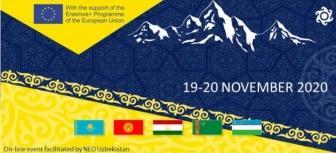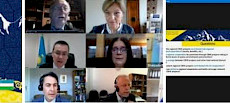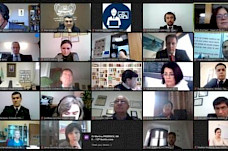| Event = 23/11/2020 |
|
Cluster Meeting on the impact of Capacity Building in Higher Education (CBHE) projects in Central Asia
Regional Cluster Meeting on the impact of Erasmus+ projects in the field of Capacity Building of Higher Education in Central Asia was held in online format on November 19-20, 2020. The event was initiated by the Education, Culture and Audiovisual Executive Agency (EACEA) of the European Commission and organized by EACEA, the DG for Education, Youth, Sports and Culture and the National Erasmus+ Offices in Uzbekistan, Kazakhstan, Kyrgyzstan, Tajikistan and Turkmenistan. The meeting was opened by the welcoming speeches of Ms Sophie Beernaerts, Head of the EACEA Erasmus+ Program Office, and representatives of Ministers of Education and Sciences of Uzbekistan, Kazakhstan, Kyrgyzstan, Tajikistan, Turkmenistan
During workshop meetings, the participants made presentations and discussed the results of Erasmus+ CBHE projects, challenges of project management and implementation during the COVID-19 pandemic period, issues of expanding cooperation at regional and interregional levels, and also developed recommendations for new Erasmus Program for 2021-2027. Workshop 5 was coordinated by the NEO Turkmenistan and addressed the topic “CBHE projects promoting University & Business cooperation and employability”. On behalf of Turkmenistan, Ya. Jumamuradov (International University of Humanities and Development of Turkmenistan, project Coordinator) welcomed the workshop participants.
The workshop participants discussed the impact of Erasmus+ projects aimed at developing cooperation between higher education institutions and business partners. The implementation of CBHE projects has increased the employment opportunities of university graduates. The project teams adapted and implemented new higher education curricula to meet the labor market requirements, and developed schemes targeted at the formation of students entrepreneurial competencies based on their involvement in the entrepreneurial environment, providing them with internships and jobs, and attracting them to work on fulfilling real business orders. Almost all speakers noted that among the projects’ important results there were the creation of new curricula, implementation of long-term and short-term professional development courses, primarily for teachers which influenced on increasing the level of teaching and training students. The participants also discussed the project challenges and recommendations for increasing the impact of projects in the future. The plenary speeches of EU representatives can be read here: Anila Troshani: “Impact of Higher Education Development Projects in Central Asia” Adrian Veale: “European Union-funded Regional Cooperation in Education: A Common Commitment” |


